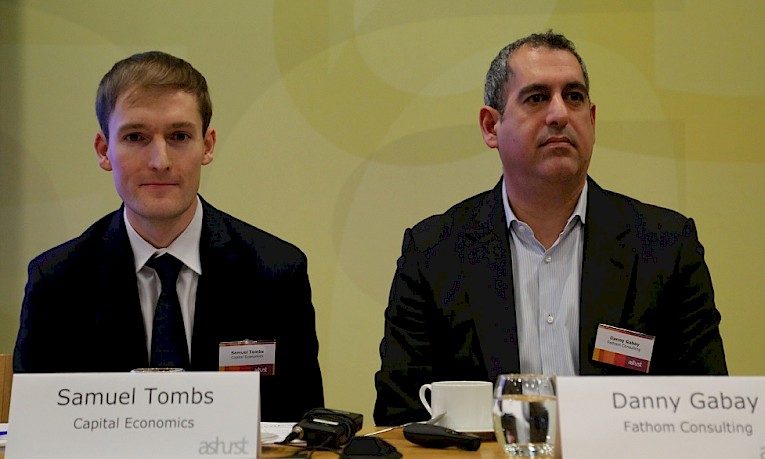13 January 2015
Outlook for the UK Economy
Danny Gabay, Co-Director, Fathom Consulting
Samuel Tombs, Senior UK Economist, Capital Economics
The two shared some views – such as the recovery being dependent on a number of unsustainable supports – but also disagreed on other issues, such as the ability of households to cope with higher interest rates and whether the banking crisis had been resolved effectively.

Samuel kicked proceedings off by talking about a slowing recovery thanks to fading support from such factors as house prices, employment, and fiscal stimulus. Uncertainty surrounding the general election also risked generating a bad outcome for growth, particularly as investment could be harmed in the event of a referendum on EU membership in the next parliament. Most importantly, for the recovery to perpetuate stronger productivity would be needed, and this had been very weak during the decade to date (having grown at an annual rate of just 0.5%). A structural decline in oil/gas and financial services output suggests that we won’t return to the previous trend in productivity. But, with productivity far lower than that of the US there was scope for some convergence going forward according to Samuel.
Moreover, he argued that oil prices should be a major boost to the recovery via their impact on real wages. But at the same time there are risks from the possibility of inflation moving into negative territory. Samuel noted that the Bank of England had in the past tightened policy at the same time inflation was comfortably below target, and believes that the same could happen again (in the second half of this year) if the Bank’s concern about domestic inflationary pressure rises thanks to waning spare capacity. Indeed he points to the evidence of still robust service sector inflation despite the recent sharp fall in the headline CPI rate. Capital Economics expects the Federal Reserve to raise rates this year given that the recovery and price pressures in the US are more advanced than in the UK, which in turn should put additional pressure on the BoE to follow suit via its impact on relative exchange rates.
Higher interest rates should not prove too painful for the economy in Samuel’s view on account of: i) debt/income ratios being at their lowest in more than a decade, ii) interest payments relative to income being at record lows, iii) fixed rate mortgages being more common (thus delaying the impact of higher official rate rises), iv) there being scope to refinance at lower interest rates, v) the likelihood that mortgage rate spreads would narrow and vi) that household and firms had built up sizable buffers in the form of cash deposits at banks.
Danny disagreed with this particular prognosis, however, arguing that people are not in a position to cope with higher interest rates. The reason? Still high levels of debt. Danny noted that while the UK household debt/income ratio had fallen from its 170% peak, it remains well above the peak in the US boom. The idea that some economists held that there had been no boom in the UK pre-crisis was wrong in Danny’s opinion – the saving ratio had collapsed more than in the Lawson boom of the late 1980s, debt was higher and house prices had risen more.
The UK’s problem according to Danny was that the economy had faced an underlying supply shock at the same time as a hit to demand. This is the first time in 150 years of economic history that productivity has ever stagnated for such a long period and that failures in forecasting post the financial crisis could be blamed on a lack of understanding of this fact. How can we tell that it’s a supply shock? Because over recent years growth has disappointed at the same time inflation has been stronger than expected. The corollary of weak productivity is weak wages, and this is why Danny believes the Office for Budget Responsibility’s forecasts for income tax receipts have disappointed time and time again.
Danny explained the supply shock by taking an opposite position to Samuel in relation to banks. While Samuel was more optimistic on the financial sector, arguing that banks were making good progress in repairing balance sheets, Danny argued that while the US had effectively dealt with the banking crisis (in a similar way to Sweden in the early 1990s) the UK had not. Rising unemployment, jumps in foreclosures and the Troubled Asset Relief Programme (TARP) had been crucial to the US recovery and left banks in very rude health versus the UK (as evidenced by relative bank share prices in the US/UK). In the UK company failures/startups had been insufficient according to Danny, and the authorities should have purchased troubled assets in a TARP style programme instead of “the shiniest assets possible”.
But this is where Danny and Samuel do agree – that supports to growth have been temporary. In Danny’s view, household borrowing was key to the turnaround in growth from 2013, rather than the easing of concerns about the outlook for the euro area. Banks had been “bribed” by the government to offer debt to households who could not afford it, and this bribe has now been spent. After the temporary boom in demand all that is left is a weak supply trend. Danny said that the UK more generally is living beyond its means, as illustrated by a ballooning current account deficit, and as a result the risks to sterling are significantly to the downside. The external environment looks decidedly fragile too, with Fathom’s momentum indicator pointing to growth in China close to 4% rather than the officially reported 7% rate.
So, in summary – where Danny and Samuel agreed was on the temporary nature of the boost to economic growth that the UK has witnessed over the past two years. However, Danny was less convinced that banks were in far better shape and that households could effectively cope with rising interest rates. This looks to be reflected in their respective forecasts for GDP growth – while Capital sees the UK economy expanding by 3% in 2015 and 2016, Fathom is somewhat less cheery on 2.2% and 1.6%.


